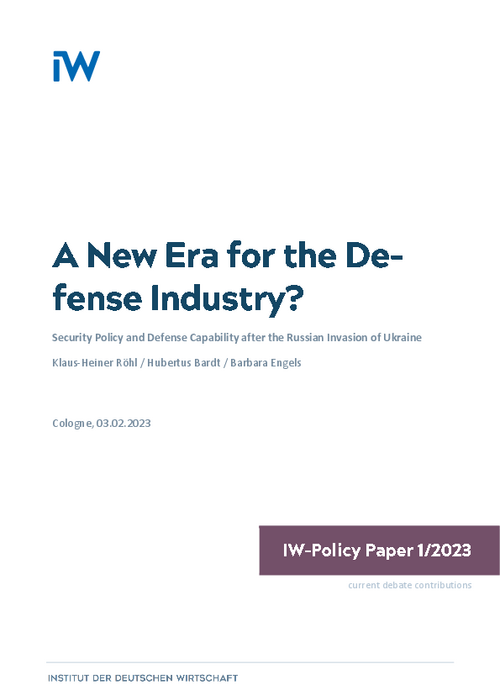The Russian attack on Ukraine has brought the question of the German Armed Forces’ operational capability back into focus. National defense, which seemed to play only a minor role with the end of the Cold War and the dissolution of the Warsaw Pact and the Soviet Union in 1991, now has gained a higher political priority again.

A New Era for the Defense Industry?: Security Policy and Defense Capability after the Russian Invasion of Ukraine

The Russian attack on Ukraine has brought the question of the German Armed Forces’ operational capability back into focus. National defense, which seemed to play only a minor role with the end of the Cold War and the dissolution of the Warsaw Pact and the Soviet Union in 1991, now has gained a higher political priority again.
In his government declaration of 27 February 2022, German Chancellor Olaf Scholz spoke of a turning point in time due to this war and announced a special fund of 100 billion euros to strengthen the country’s defense capabilities. However, these extensive funds can only have a sustainable effect on security policy if the possibilities of the defense industry to supply new weapons systems and the possibilities of the Bundeswehr to use and maintain these weapons are brought into line. In 2020, the approximately 55,500 employees in the defense industrial sector in Germany produced weapons, combat aircraft, warships and military vehicles for approximately 11.3 billion euros; both figures were lower than in 2015 despite Russia's occupation of Crimea in 2014.
This policy paper therefore presents the status of plans to strengthen the Bundeswehr and classifies them in terms of security policy. In addition, the German defense industry with its sectors of aircraft and spacecraft, naval shipbuilding, combat vehicles as well as weapons and ammunition is portrayed and the increasingly important area of cyber defense is discussed. The policy paper concludes with defense policy and defense industry recommendations derived from the previous chapters. Recommendations include a long-term plan for strengthening the Bundeswehr and the German defense industry, stronger cooperation with European partner countries on defense projects to reduce dependency on the U.S. and including the defense industry in the European taxonomy for the financial sector, as its current status of non-sustainability threatens especially smaller and medium defense companies that are important for European security.

A New Era for the Defense Industry?: Security Policy and Defense Capability after the Russian Invasion of Ukraine

More on the topic

Further training needs of the automotive industry in transformation
Due to the ecological and digital transformation, significant parts of the German economy, particularly the industrial sector, are currently undergoing a transformation. This development also extends to the automotive sector, which occupies a vital position in ...
IW
Valuing Companies' Data
Data is becoming increasingly important both for companies and for national economies. Since the full potential of business data can only be realised when several users exploit it simultaneously, data sharing is also becoming more common.
IW